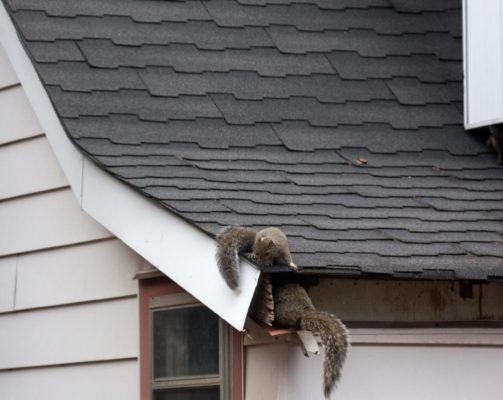Autumn’s Unwelcome Guests
When fall days get shorter and colder, raccoons, mice, and squirrels know that it’s time to start preparing food and shelter for the winter months. They do not hibernate in winter, and the warmth and security of your walls and attic make your home the perfect winter den. While ideal for them, for you it means damage to your home and health risks for your family.
In our three-part blog series Autumn’s Unwelcome Guests, we’ll look at how raccoons, mice, and squirrels get into your home, the damage they cause, and the health risks they pose. And of course, how Modern Pest’s Wildlife Control Team can help you get these critters out of your house and back to nature.
Part 3: Squirrels
Squirrels don’t hibernate in the winter, but they still need a warm, safe place to sleep. And when it’s severely cold out, they’ll stay in their cozy den for days at a time, only venturing out midday when temperatures are warmest. If you’ve heard any scurrying or squeaking coming from your attic or walls, that cozy den just might be your home.
Think you might have squirrels living in your walls or attic? Call Modern Pest today for a site evaluation before it gets out of control!
Fattening up for Winter
Food is scarce for squirrels in the winter, so they prepare by burying stashes of nuts and eating large amounts. In just a week, a squirrel can eat its own body weight in food. These fat reserves will help get them through the harshest winter conditions. Squirrels stash nuts in various locations, and sometimes even forget where they buried them. Some of these forgotten seeds will germinate and grow into trees and shrubs. But squirrels can also use their strong sense of smell to detect their rations through a foot of snow.
Making Your House Their Home
If a squirrel can gain entrance to your home, they’ve found the perfect den for the winter. They will build nests and store their food in their new safe space. They might even birth and raise their babies there. So how are they getting in?

Breaking In
Squirrels are clever and can gain entry to your home in several ways. Uncapped chimneys are an easy ingress. They are also capable of chewing holes under eaves and through soffits. When a tree limb overlaps a roof, it’s the perfect bridge from a tree to your home. Any small, existing opening into your abode can mean a new squirrel roommate for the winter.
Destruction
Once they’re in, squirrels will start to damage your home.
- Squirrels damage insulation by moving it around and tearing it up to make nests. This reduces the efficiency of the insulation.
- Squirrels chew through electrical wiring, creating fire hazards and costly repairs.
- Squirrels urinate and defecate everywhere, soiling insulation and wood. Their waste also creates health risks for humans and pets.
Modern Pest’s Wildlife Control Team can solve your squirrel problem. Call us today at 1-800-323-7378 for more information!
Health Risks
In addition to damage, squirrels present several health risks to humans.
- Salmonellosis: Salmonella bacteria is found in squirrel feces. It causes diarrhea, abdominal cramps, and fever. In some cases, it requires hospitalization.
- Leptospirosis: Leptospirosis bacteria is also found in squirrel feces. Symptoms include fever, headache, vomiting, jaundice, and rash.
- Flea infestations: Squirrels are commonly infested with fleas. The fleas can infest your home and spread to household pets.
- Tick-borne illness: Squirrels are also usually infested with ticks. Tick-borne illnesses like Lyme disease and tularemia can be spread to humans. Lyme causes nerve pain, stiffness, and inflammation of the brain or spinal cord. Tularemia causes swollen lymph nodes and ulcers.
The Modern Solution
If you suspect you have squirrels taking up residence in your house, call Modern Pest before the issue gets out of hand. A Modern Pest Wildlife Team member will come out and do a site evaluation. If they deduce that you have a red or gray squirrel issue, they will then assess the best way to solve it. This includes installing one-way doors so the squirrels exit your building but cannot re-enter. They will then seal up all access points with mesh. Once the squirrels have been excluded, the team member will remediate your attic by surface-cleaning, sanitizing, and deodorizing the area. They can also replace damaged insulation. They will also provide tips on how to avoid future squirrel infestations, such as trimming trees away from your roofline.
If you think you have a squirrel problem, call Modern Pest today at 1-800-323-7378 to schedule a site evaluation. Or click here to learn more about Modern’s Wildlife Control Services.
